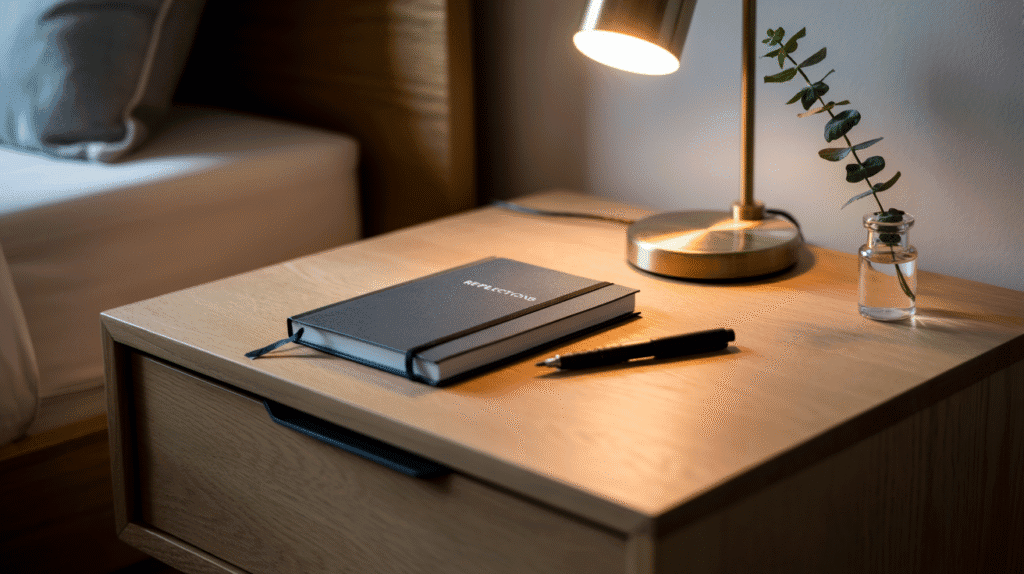
Journaling sounds great in theory—reflect, process your thoughts, track your growth. But if you hate writing, even the word journal can bring back memories of school essays, forced diary entries, or blank pages staring you down in silence.
Maybe you’ve tried before. Bought the perfect notebook, promised you’d write every night… and then let it sit untouched for weeks. If writing feels like a chore or you just don’t know what to say, you’re not alone.
But here’s the truth: you don’t have to love writing to love journaling. In fact, some of the most powerful journaling habits don’t involve full sentences, deep insights, or even full pages.
The key is to redefine what journaling looks like, so it works for your brain, your style, and your life. Whether you’re a list-maker, a doodler, a bullet-point thinker, or someone who just wants mental clarity without the pressure—there’s a way to build this habit on your terms.
This article will show you how.
When most people hear the word journaling, they imagine long, poetic entries filled with deep reflections or daily summaries written in perfect handwriting. That image alone is enough to make many people quit before they begin.
But journaling doesn’t have to be eloquent—or even complete sentences. In fact, the best journaling habits are the messiest, shortest, and most inconsistent ones that still happen.
You don’t need to write “well.” You just need to write something.
Journaling can look like:
The goal isn’t to impress anyone. There’s no grade, no editor, no audience. It’s not about creating a legacy—it’s about offloading mental noise, gaining self-awareness, or just documenting what matters to you.
Give yourself permission to write “badly,” inconsistently, or incompletely. What matters most is that you show up. Even a few scribbled thoughts count.
Once you remove the pressure to journal right, you open the door to journaling your way—and that’s when it becomes a habit you can actually enjoy.

If you hate traditional journaling, it might not be journaling itself—it might be the format that doesn’t fit your brain. People process thoughts in wildly different ways, and forcing yourself to write like someone else only builds resistance.
That’s why choosing a journaling style that aligns with how you think is a game-changer. When your method matches your mental wiring, journaling stops being a struggle and starts becoming intuitive.
Let’s break it down:
| If you’re… | Try this format |
|---|---|
| A visual thinker | Mind maps, doodles, diagrams |
| A list-maker | Bullet points, numbered reflections, gratitude logs |
| Emotionally driven | One-word check-ins, mood tracking, feelings journal |
| Verbally expressive | Stream of consciousness writing, free-flow journaling |
| Analytical or goal-oriented | Habit tracking, prompt-based entries, review pages |
You don’t have to stick to one format forever. You can mix and match, or change it based on your mood or the season of life you’re in.
Some days you might just rate your day from 1 to 10. Other days, you might write one sentence, or dump three pages of messy thoughts. It all counts.
The best format is the one you’ll actually return to—because it feels natural, not forced.
One of the main reasons journaling doesn’t stick is because it feels like too much work. Even if you want to do it, finding your notebook, thinking of something meaningful to write, and actually sitting down can feel like climbing a mental mountain.
So here’s the trick: don’t aim for meaningful. Aim for easy.
You don’t need 20 minutes, the perfect pen, or a deep insight. You just need to lower the bar until it’s almost impossible not to do it.
Start with:
Even more important than what you write is where and when you do it. Attach journaling to a moment that already happens—like after brushing your teeth, while waiting for your coffee, or just before bed.
Leave your journal visible and accessible. A closed drawer is where habits go to die. Keep it on your pillow, next to your phone charger, or by your coffee mug. The fewer steps between you and the habit, the better.
And if writing feels heavy one day? Just write: “Don’t feel like journaling today.” That counts. You showed up.
Journaling becomes a habit not when it’s deep, but when it’s doable.

Many people treat journaling like another box to check off—a task to complete just because it’s on a list of “good habits.” But when journaling becomes just another obligation, it loses its power. That’s when it starts feeling heavy, forced, or even pointless.
The truth is, journaling isn’t a task—it’s a tool. A personal instrument to process, release, clarify, and reset. Used well, it becomes a kind of mental hygiene: a way to clear emotional residue before it builds up.
Think of these moments:
None of this requires a perfect entry. You don’t need to write full sentences or sound wise. You just need to be honest—and that honesty, even in fragments, is where the shift happens.
If journaling feels like a burden, ask: How could I make this feel useful instead of dutiful?
Sometimes all it takes is a three-minute check-in. Other times, you may want more space. What matters isn’t how much or how well you write—it’s whether it helps you feel lighter, clearer, or more grounded afterward.
Let journaling serve you—not the other way around.
You don’t have to love writing to build a journaling habit. You don’t need the perfect notebook, deep thoughts, or flowing sentences. What you need is space—a space to be real, unfiltered, and fully yourself, even if just for two minutes a day.
Journaling isn’t about performance. It’s about presence. It’s a private pause where you meet your own mind without pressure. When you drop the expectation to write something worthy, you begin to see how valuable even your messiest, briefest reflections can be.
Start with one word. One sentence. One list. Start with a format that fits your brain. Keep it visible. Keep it light. And most importantly—keep it yours.
Try it for 7 days. No rules. No pressure. Just you, a pen, and the freedom to show up however you are.
You don’t need to write more—you just need to write enough to reconnect with yourself.